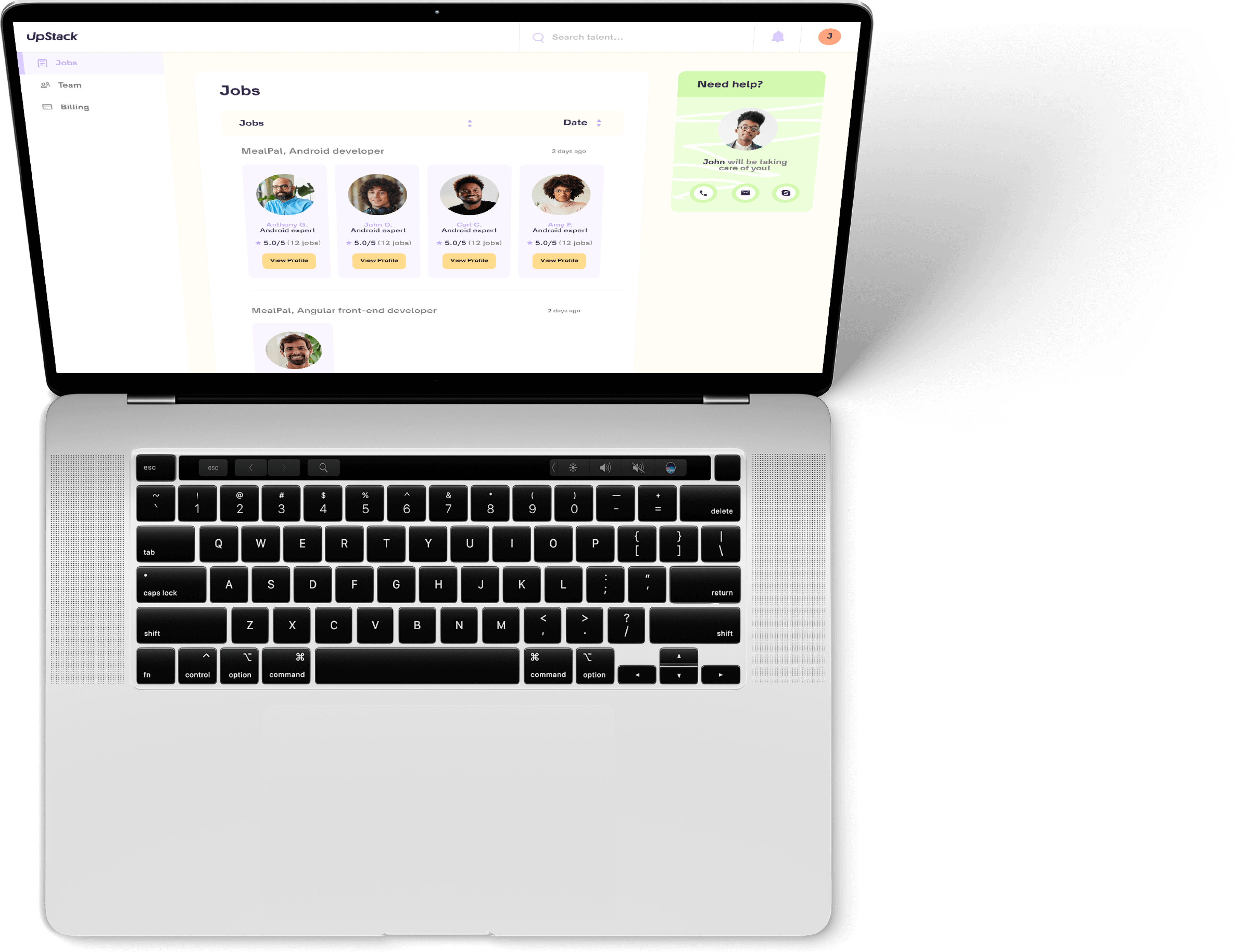


Schedule a Consultation and Hire a .Net Developer
Stella B.
Available
.NET Developer
-
Experienced .NET engineer with seamless project implementation
-
Loves guacamole & hates spoilers

-
Marcus T.
Available
Net Engineer
-
Stacked portfolio of beautiful, functional websites
-
Known for his epic charcuterie & cheese boards

-
David M.
Available
Mobile Developer
-
Mobile engineering guru with a knack for translating stakeholder needs
-
Would rather be diving Palau’s Blue Corner

-
Top UpStack .NET Developers
Hire .NET Developers with Upstack
Finding the right .NET developer for your team can be a challenge, but it’s worth the effort. Having the right .NET developer on your team can help you stay ahead of the competition and increase productivity. When it comes to hiring .NET developers, there are a few key considerations that you should keep in mind. You want to make sure that the developer you hire has the right skills and experience for the job, is a good fit for your team, and is willing to work hard and collaborate. You should also make sure that the developer is well-versed in the latest .NET frameworks and technologies to ensure that your projects are developed on the cutting edge. Making sure that you hire the right .NET developer can be the difference between success and failure.
What is .NET?
.NET is a software framework developed by Microsoft. It enables developers to create a variety of applications, including web applications, mobile apps, desktop apps, and more. The .NET Framework consists of a set of tools and libraries that provide functionality to software developers. The .NET Framework includes products like Visual Studio, C#, ASP.NET, and SQL Server. The .NET Framework has been around since 2002, and it’s currently in its 4th version. The .NET Framework is the most widely used software development framework in the world. It’s used in a variety of industries, including healthcare, education, government, and more. It’s a great framework for creating web applications for both the desktop and mobile devices. Developers can use .NET to build and deploy apps for a wide range of devices and operating systems, including Windows, macOS, Android, iOS, and more.
What skills and experience should you look for when hiring a .NET developer?
There are a few key skills and experience areas that you should look for when hiring .NET developers. The first is technical expertise. You want to make sure that the .NET developers on your team are competent in the latest technologies, programming languages, and frameworks. You don’t want to hire a developer who is using out-of-date technologies and programming languages that don’t align with your current or future projects. You also want to make sure that the developer is skilled in the latest versions of the .NET framework, as well as key languages and technologies such as C#, ASP.NET, JavaScript, HTML, CSS, SQL, and more. You should also look for the following traits when hiring .NET developers: - Strong knowledge of development methodologies and best practices
How to assess a .NET developer's technical abilities?
You can assess a .NET developer’s technical abilities in a couple of ways. The first is to look at their resume. Make sure to look at both their experience and education. If a candidate has the right skills, experience, and education for the job, then you can consider them for an interview. Another way to assess a developer’s technical abilities is to conduct a technical interview. You can use a variety of questions to assess a candidate’s technical abilities. Here are a few examples:
- What is the difference between Object-Oriented Programming (OOP) and Procedural Programming?
- What are the difference between C and C++?
- What are the core features and functionality of .NET?
- Why do you think is .NET the most widely used software development framework?
What should you look for in terms of team fit?
A team’s culture and dynamics are often overlooked when hiring new employees. However, when it comes to hiring .NET developers, you should look for team fit in addition to technical expertise and skills. You want to make sure that the .NET developers on your team are a good fit for your culture. You want to hire people who are collaborative, creative, and reliable. You don’t want to hire someone who is going to work in silo and not contribute to the team. You want developers who are willing to collaborate and share knowledge. They should feel comfortable working with the rest of your team. You should also make sure that the developer has the right personality to work with your team. You should hire developers who are confident and able to work autonomously. You also want developers who are reliable and committed. You don’t want developers who are going to be flaky or disappear without warning.
What are the latest .NET frameworks and technologies?
When hiring .NET developers, it’s important to find out what the latest frameworks and technologies are. This will help you identify which developers are up-to-date and knowledgeable in the latest technologies. Here are a few of the latest .NET frameworks and technologies that you should be aware of:
- .NET Core - .NET Core is the latest version of the .NET framework. It’s cross-platform and open source, meaning that it can be used to build applications for Windows, macOS, and Linux. It’s a lightweight version of the .NET Framework that has fewer features, but it has improved performance.
- ASP.NET Core - ASP.NET Core is a web application framework that can be used to build modern and scalable web applications using .NET Core. It can be used to build web apps that run on the server or are built using JavaScript.
- Entity Framework - Entity Framework is a data-access technology that allows developers to work with data from different data sources. It’s used to access data from relational databases, such as SQL Server, Oracle, and MySQL.
- Azure - Azure is a cloud computing platform that can be used to build, deploy, and host websites and applications. It allows developers to build website and apps without having to invest in the hardware required to do so.
What are the benefits of hiring a .NET programmer?
Hiring .NET developers can help you achieve a wide variety of goals and benefits, including:
- Increased productivity
- Reduced development costs
- Better quality of work
- Less risk
- Ability to expand your team and scale up quickly.
Having the right .NET developers on your team can help you achieve these benefits and more. When it comes to hiring .NET developers, there are a few key considerations that you should keep in mind. You want to make sure that the developer you hire has the right skills and experience for the job, is a good fit for your team, and is willing to work hard and collaborate. You should also make sure that the developer is well-versed in the latest .NET frameworks and technologies to ensure that your projects are developed on the cutting edge.
What should you consider when making an offer?
When making an offer to a .NET developer, you should consider their salary expectations and compensation. You should also consider the location of the job and the work hours. You should also provide a benefits package that includes things like health and dental coverage, paid time off, and more. You should also provide a detailed job description that outlines what is expected of the .NET developer. You should be as transparent as possible about the job and the expectations so that you can find the right developer for the job. You should also consider the following when making an offer to a .NET developer: - The skills and experience of the candidate - Their salary expectations - The benefits package - The work hours - The location of the job
What resources are available for .NET developers?
There are a variety of resources that .NET developers can use to stay current with the latest technologies and trends in their field. Here are a few places where you can find .NET-related resources and information: - Microsoft Official Academic Course (MOAC): This site provides online training for programming languages and technologies, including .NET.
They trust Our .NET Developers
Why hire a .NET developer with Upstack
![.NET Developer and Programmer Icon]()
Top .NET talent pre-vetted for a perfect fit.
Our 8-point assessment evaluation ensures that every senior .NET developer you interview exceeds expectations across technical, cultural, and language criteria.
![.NET Programmers Computer Icon]()
Hire reliable, passionate .NET developers.
From late-night sprints to jumping on a last-minute face-to-face, we ensure that your recruits are down to get the job done right.
![.NET Programmers High Five Icon]()
Risk-free 14-day trial.
Confidently onboard candidates with our no-questions-asked trial period. We’ll walk you through the contract-to-hire process if and when you’re ready to make it permanent with your new .NET engineer.
![.NET Computer Programmer Icon]()
Our Client Success Experts provide white-glove service.
Stay laser-focused on your business goals while our team of experts curates potential candidates and manages seamless programmer onboarding.
![.NET Developer Writing Notes Icon]()
Build your optimal team confidently, quickly.
UpStack handles everything including background and reference checks, legal issues, and more. Our platform streamlines billing, timesheets, and payment all in one easy-to-access place.
Schedule a call with a Client Success Expert to get starting hiring a .NET developer.
Start hiring Start hiring Start hiring
Hire from the Best.
Working with our Client Success Experts, we’ll help you build the remote team of your dreams with top .NET talent from around the world.
Pre-vetted, reliable .NET developers are standing by. Learn more about us and why UpStack is the perfect toptal alternative.





Hiring .NET Developers | FAQs
How much does it cost to hire a .NET developer?
UpStack has a simple billing model where each .NET developer has a standard hourly rate averaging between $65-$75 per hour. Rates are based on skills, knowledge, and experience, and our developers are available mainly for full-time engagement (40 hours per week) and the occasional part-time opportunity (20 hours per week).
What is the process to find a .NET developer?
You’ll connect with an UpStack Client Success Manager to determine your immediate needs. Our team uses a combination of AI and personal assessment to short-list candidates that match your job requirements. From there, you interview, select, and onboard the perfect developer, all within days of your initial call.
How does UpStack find its .NET developers?
UpStack’s talent recruitment team connects with software developers around the globe every day. Each .NET programmer is vetted for technical, communication, and other soft skills necessary for a developer to successfully work with your team. Once vetted, the candidates are accepted into the UpStack developer community.
How is UpStack different from an agency or recruiter?
UpStack's community of available, pre-vetted engineering talent means minimizing roadblocks to scaling your team effectively, efficiently, and immediately. Our Client Success Experts work with you and your UpStack developer to ensure a smooth and seamless engagement.
Can I hire UpStack .NET developers directly?
Yes, you can hire UpStack .NET developers at any time, and with the same assurance of smoothly on boarding talent risk-free. First, we’d create a job opening on our portal. Then, we’d vet, interview, and match developers that meet your needs. If you’re satisfied at the end of the 14-day trial period, at any time you can directly hire them.
Additional .Net Programming Information
What are some common questions to ask a .Net developer?
Here are some common .NET developer interview questions:
- Can you explain the .NET framework and its components?
- What is the difference between a value type and a reference type?
- How do you implement inheritance in a .NET class?
- Can you describe the difference between managed and unmanaged code in .NET?
- Can you explain the role of the Common Language Runtime (CLR) in the .NET framework?
- What is garbage collection in .NET, and how does it work?
- Can you explain the purpose of the System.Net namespace?
- Can you describe the difference between a thread and a process in .NET?
- Can you explain the role of the Model-View-Controller (MVC) pattern in .NET web development?
- Can you give an example of how to implement dependency injection in a .NET application?
These questions are intended to assess a candidate's understanding of the .NET framework and their experience as a .NET developer. Depending on the specific job requirements, you may want to tailor the questions to focus on specific topics or technologies related to the position.
How much do .Net Developers traditionally make?
The salary of a .NET developer can vary depending on factors such as their level of experience, the location of the job, and the specific industry they work in. According to data from Glassdoor, the average salary for a .NET developer in the United States is around $76,000 per year. However, this number can range from around $50,000 for entry-level positions to over $100,000 for more experienced developers. It's also worth noting that salaries for .NET developers can vary significantly depending on the location of the job. For example, .NET developers in San Francisco and New York City tend to earn higher salaries than those in other parts of the country.
Can you developer .Net on a Mac?
Yes, it is possible to develop .NET applications on a Mac. The .NET framework is supported on MacOS, and there are several tools and IDEs available that allow you to create .NET applications on a Mac. For example, Visual Studio for Mac is a popular IDE for .NET development on the Mac platform. Additionally, the .NET Core runtime, which is a cross-platform implementation of the .NET framework, can be installed on a Mac, allowing you to build and run .NET applications on the MacOS operating system.
Which Azure certification is best for .Net developers?
There are several Azure certification options that would be relevant for .NET developers. Some of the most popular ones include:
- Azure Developer Associate: This certification is geared towards developers with experience in building and deploying cloud-based solutions using Azure. It covers a wide range of topics, including Azure storage, security, compute, and data solutions.
- Azure DevOps Engineer Expert: This certification is focused on the skills needed to implement continuous integration and continuous delivery (CI/CD) pipelines using Azure DevOps. It is a good option for developers who want to learn more about DevOps practices and how to apply them in an Azure environment.
- Azure Solutions Architect Expert: This certification is geared towards architects who design and implement Azure solutions. It covers a broad range of topics, including Azure architecture, security, networking, and disaster recovery.
Ultimately, the best Azure certification for you will depend on your specific career goals and areas of interest. It's a good idea to research the different certification options and choose the one that aligns best with your needs.















